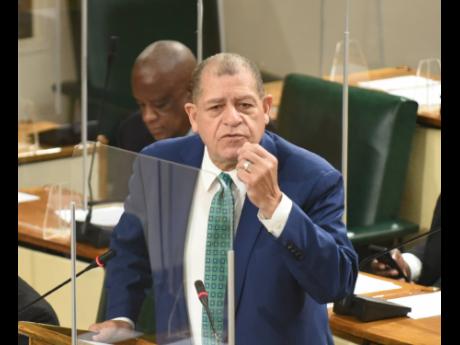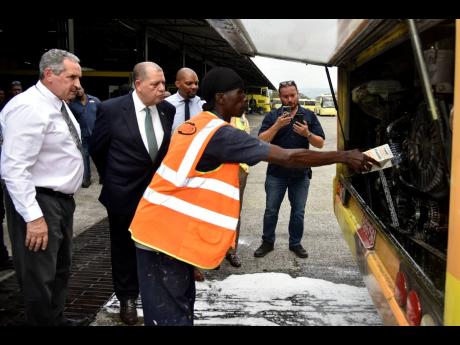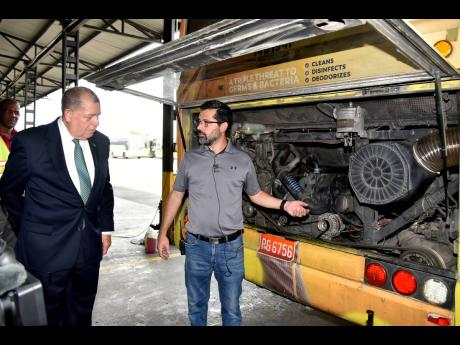Better late than never - Shaw
Transport ministry to engage Costa Rican company on fire suppressant system for JUTC
In an effort to prolong the life of the Jamaica Urban Transit Company’s (JUTC) ageing fleet of buses, Industrial Fire and Rescue Equipment SA conducted a cooling-down exercise on Monday to demonstrate how a fire suppressant system supplied by them would react quickly in the event of an engine fire.
The chief executive officer of the Costa Rica-based company, lvaro Calvo, and fuel engineer, Reiner Romero, conducted a pilot test of the system at the JUTC’s Ashenheim Road depot in Kingston that demonstrated the processes the technology goes through in responding to a fire.
To alert the driver that smoke and fire have been detected, an alarm is first sounded. A forrex liquid, a fire suppressant that works on diesel, gasoline, and hydraulic oils, is then diffused from the system, instantly cooling the engine. The environmentally friendly substance also hinders the engine from rekindling.
Romero informed The Gleaner that the forrex liquid is dispelled from a steel pipe line making it “almost impossible to get the liquid going anywhere else”, and potentially causing further damage to other parts in the bus.
He added that the system would have no direct contact with passengers as it is situated within the engine compartment.
Audley Shaw, minister of transport and mining said that the technology is vital in aiding operators to not only save the bus from being destroyed, but, more importantly, it allows them enough time for passengers to disembark and evidently save lives.
“This is a technology that apparently has been around for about four to five years. Better late than never, that we are getting this technology into Jamaica now to save our older buses which are more prone to fire because of the age,” Shaw added.
He disclosed that the 70 new buses will be joining the JUTC’s fleet this year bringing the total close to 300 buses. This is inclusive of the 50 buses – 45 diesel and five electric – that are scheduled to leave China by the end of the month to arrive in Jamaica in a short while, along with 20 buses which use liquefied natural gas.
He added that in 2024, the government is looking to add between 100 and 150 more buses to the fleet.
Shaw indicated the government’s interest in the technology, stating that the ministry was planning to install the system on all the buses in the JUTC.
SENSITISATION PERIOD
The state-owned company delivers public transportation services seven days a week. Paul Abrahams, managing director, told The Gleaner that the buses operate for a total of 16 hours per day at high temperatures, heating up close to 200 degrees. This increases the likelihood of fuel line or hydraulic line breaking and spraying the fuel on to internal parts of the bus that are hot causing it to ignite.
Abrahams added that in 2022, the company did not record any events of a bus fire, but noted that about six buses had been destroyed by fire in previous years.
He stated that the technology would prevent the loss of lives and the loss of a $20-million unit. He added that once the unit was returned to the depot and attended to, within a few hours it can be back out on the road.
Abrahams said that the company would undergo a sensitisation period to educate its staff on the operations of the system after the procedure of procurement has been finalised. He added that the fire prevention team of the JUTC which deals with the maintenance of fire hotspots within the engine compartment will also be educated about the system.



